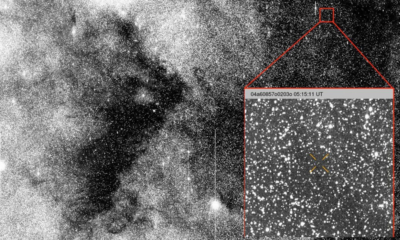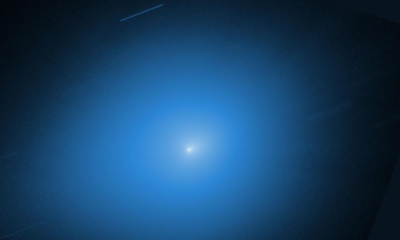Science
NASA Rover Detects Lightning on Mars in Groundbreaking Discovery

A NASA rover has made a remarkable discovery on Mars, capturing what scientists interpret as lightning strikes. This unexpected finding emerged from the sounds recorded by the **Perseverance rover**, which has been exploring the Martian surface since **2021**. Over a period of nearly four Earth years, researchers documented **55 instances** of what they describe as “mini lightning,” predominantly occurring during dust storms and dust devils.
The electrical discharges were detected by a microphone situated on the rover’s tall mast. Most of these occurrences transpired on the windiest solar days, suggesting a connection between atmospheric conditions and electrical activity. The lead author of the study, **Baptiste Chide** from the **Institute for Research in Astrophysics and Planetology** in Toulouse, expressed excitement over the discovery: “It opens a completely new field of investigation for Mars science,” he stated, adding that the findings could lead to insights about the chemical effects of electrical discharges.
Details of the Discovery
The electrical arcs produced by these lightning strikes measured only a few inches in size and occurred within six feet of the rover’s microphone. The audio recordings captured sparks resembling static electricity, intermingled with the sounds of gusting winds and dust particles hitting the microphone. Although the findings are compelling, experts caution that they rely on a single instrument designed primarily for geological studies, not for detecting lightning.
Daniel Mitchard from **Cardiff University**, who was not involved in the research, commented on the significance of the discovery. “It really is a chance discovery to hear something else going on nearby, and everything points to this being Martian lightning,” he explained. Nonetheless, he acknowledged that further verification through new instruments would be necessary to solidify these findings.
Lightning has been confirmed on other planets, such as **Jupiter** and **Saturn**, and Mars has long been suspected to have similar phenomena. The research team analyzed **28 hours** of audio from the **Perseverance rover**, focusing on episodes of “mini lightning” based on acoustic and electric signals. The discharges generated by rapidly moving dust devils lasted only a few seconds, while those associated with dust storms were recorded for as long as **30 minutes**.
Implications for Future Research
Chide likened the discovery to “a thunderstorm on Earth, but barely visible with the naked eye and with plenty of faint zaps.” He noted that Mars’ thin, carbon dioxide-rich atmosphere absorbs much of the sound, making some of these electrical discharges difficult to perceive.
The **Perseverance rover** is currently exploring a dry river delta on Mars, collecting rock samples to search for signs of ancient microscopic life. NASA plans to return these core samples to Earth for laboratory analysis, although this mission is on indefinite hold as the agency seeks more cost-effective options.
As scientists continue to analyze the data, the discovery of lightning on Mars may lead to further questions about the planet’s atmospheric dynamics and its potential for hosting life. The findings underscore the importance of ongoing research and exploration of Mars, expanding our understanding of the Red Planet and its weather patterns.
-

 World2 weeks ago
World2 weeks agoCoronation Street’s Shocking Murder Twist Reveals Family Secrets
-

 Entertainment1 week ago
Entertainment1 week agoAndrew Pierce Confirms Departure from ITV’s Good Morning Britain
-

 Entertainment5 months ago
Entertainment5 months agoKate Garraway Sells £2 Million Home Amid Financial Struggles
-

 Entertainment4 months ago
Entertainment4 months agoAnn Ming Reflects on ITV’s ‘I Fought the Law’ Drama
-

 Entertainment1 month ago
Entertainment1 month agoCoronation Street Fans React as Todd Faces Heartbreaking Choice
-

 Health4 months ago
Health4 months agoKatie Price Faces New Health Concerns After Cancer Symptoms Resurface
-

 World1 month ago
World1 month agoBailey Announces Heartbreaking Split from Rebecca After Reunion
-

 Entertainment2 weeks ago
Entertainment2 weeks agoTwo Stars Evicted from I’m A Celebrity Just Days Before Finale
-

 World2 weeks ago
World2 weeks agoKevin Sinfield Exceeds Fundraising Goal Ahead of Final Marathons
-

 Entertainment4 months ago
Entertainment4 months agoCoronation Street’s Carl Webster Faces Trouble with New Affairs
-

 Entertainment3 months ago
Entertainment3 months agoWhere is Tinder Swindler Simon Leviev? Latest Updates Revealed
-

 Entertainment5 months ago
Entertainment5 months agoMarkiplier Addresses AI Controversy During Livestream Response




















